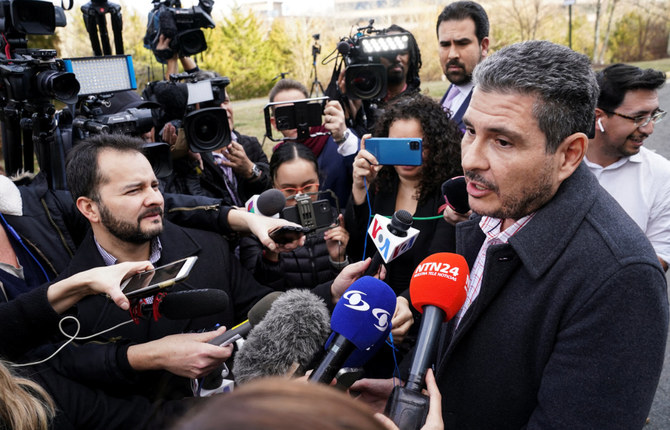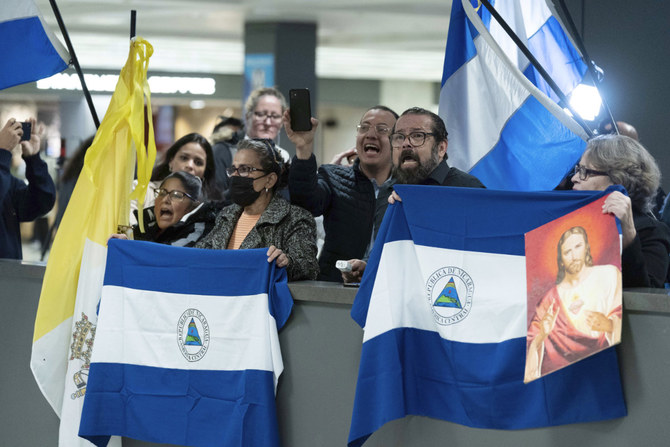MEXICO CITY: Some 222 inmates considered by many to be political prisoners of the government of Nicaraguan President Daniel Ortega flew to Washington on Thursday, US Secretary of State Antony Blinken said.
Blinken said the prisoners had been jailed “for exercising their fundamental freedoms and have endured lengthy unjust detentions.”
“The release of these individuals, one of whom is a US citizen, by the government of Nicaragua marks a constructive step toward addressing human rights abuses in the country and opens the door to further dialogue between the United States and Nicaragua regarding issues of concern,” Blinken said.
He said that among those on the plane were political and business leaders, journalists, civil society representatives and students. Blinken credited “concerted American diplomacy.”
Ortega has maintained that his imprisoned opponents and others were behind 2018 street protests he claims were a plot to overthrow him. Tens of thousands have fled into exile since Nicaraguan security forces violently put down those antigovernment protests in.
The Nicaraguan opposition’s latest count on “political prisoners” held had been 245. It was not immediately clear who was not released.
US State Department spokesman Ned Price said Nicaragua had identified 224 prisoners to be sent on the plane, but two of them declined. They were not identified.
Roman Catholic Bishop Rolando Álvarez was on a list of 39 prisoners who were not on the plane compiled by the nongovernmental group Mechanism for Recognition of Political Prisoners.
Price said those who arrived in Washington came voluntarily and would receive humanitarian parole allowing them to stay in the country for two years. They were staying at hotels under responsibility of US Customs and Border Protection and the Department of Homeland Security and the government would work with nongovernmental organizations to help in their resettlement.
“It was the Nicaraguan government that decided to offer the opportunity to these individuals to travel the United States,” Price said. “When I say this is a product of American engagement, as you know, we have long called for the release of individuals imprisoned in Nicaragua for exercising their fundamental freedoms as a first step toward the restoration of democracy and an improved human rights climate in Nicaragua.”
Back in Nicaragua, a judge read a statement saying the 222 prisoners had been “deported.”
Octavio Rothschuh, a magistrate on the Managua Appeals court, said the deportation was carried out under an order issued Wednesday that declared the prisoners “traitors to the country.” He said they were deported for actions that undermined Nicaragua’s independence and sovereignty.
Later Thursday, Nicaragua’s Congress unanimously approved a constitutional change allowing “traitors” to be stripped of their nationality. It will require a second vote in the next legislative session later this year.
Wilma Nuñez, president of the Nicaragua Center for Human Rights, said in a statement that while the prisoners’ release was welcome, “deportation is a legal term that applies to foreigners who commit crimes in a country. They want to call exile a deportation, which is absolutely arbitrary and prohibited by international human rights norms.”
Arturo McFields, Nicaragua’s former ambassador to the Organization of American States, celebrated the release, which he said the US State Department had confirmed to him.
“It is a massive freeing” of prisoners seldom seen, McFields said. He credited the prisoners’ families for never letting up the pressure.
Berta Valle, the wife of opposition leader Felix Maradiaga, said the State Department told her that her husband was on the plane.
According to US officials, also among those aboard the flight were Cristiana Chamorro, who had been a leading presidential contender before her arrest in 2021. Daughter of former President Violeta Chamorro, she was sentenced last March to eight years in prison. She was convicted of money laundering through her mother’s nongovernmental organization as Ortega pursued NGOs that received foreign funding. She was being held under house arrest.
Other one-time presidential hopefuls Arturo Cruz and Juan Sebastian Chamorro were also on the flight, US officials said.
Ortega upped his pursuit of political opponents in early 2021, looking to clear the field ahead of presidential elections in November of that year. Security forces arrested seven potential presidential contenders and Ortega romped to a fourth consecutive term in elections that the US and other countries termed a farce.
Nicaraguan judges sentenced several opposition leaders, including former high-level officials of the governing Sandinista movement and former presidential contenders, to prison terms for “conspiracy to undermine national integrity.”
Given the notoriously bad conditions at the infamous El Chipote prison and others, as well as the age of some of the opposition leaders, relatives had feared the terms may effectively be death sentences.
Hugo Torres, a former Sandinista guerrilla leader who once led a raid that helped free then rebel Ortega from prison, died while awaiting trial. He was 73.
Nicaraguan judges also sentenced five Catholic priests to prison this week for conspiracy and spreading false information. It was not immediately clear if any of them were on the flight.


Nicaragua frees 222 opponents of Ortega, sends them to US
Short Url
https://arab.news/9a54f
Nicaragua frees 222 opponents of Ortega, sends them to US

- Nicaraguan President Ortega claimed that the prisoners were behind 2018 street protests he claims were a plot to overthrow him
- Tens of thousands have fled into exile since Nicaraguan security forces violently put down those antigovernment protests in
NATO’s Rutte says Arctic talks with Trump will focus on keeping Russia, China out

- Donald Trump has repeatedly said he wanted to acquire Greenland, citing national security
- US President’s ambitions have put strain on the NATO alliance
DAVOS, Switzerland: NATO Secretary Mark Rutte said on Thursday that he and US President Trump had discussed in Davos how the transatlantic alliance should best defend the Arctic against Russia and China.
Trump has repeatedly said he wanted to acquire Greenland, citing national security, though on Wednesday he ruled out using force and suggested a deal was in sight to end the dispute over the Danish overseas territory following talks with Rutte.
Trump’s ambitions have put strain on the NATO alliance.
Rutte said he had a “very good discussion” with Trump on how NATO allies can work collectively to ensure Arctic security, including not just Greenland but the seven NATO nations with land in the Arctic.
Further talks would build on the Washington meeting last week between the United States and delegations from Denmark and Greenland. “One workstream coming out of yesterday ... is to make sure when it comes to Greenland, particularly, that we ensure that the Chinese and the Russians will not gain access to the Greenland economy (or) militarily to Greenland,” Rutte told a panel at the World Economic Forum.
Trump has repeatedly said he wanted to acquire Greenland, citing national security, though on Wednesday he ruled out using force and suggested a deal was in sight to end the dispute over the Danish overseas territory following talks with Rutte.
Trump’s ambitions have put strain on the NATO alliance.
Rutte said he had a “very good discussion” with Trump on how NATO allies can work collectively to ensure Arctic security, including not just Greenland but the seven NATO nations with land in the Arctic.
Further talks would build on the Washington meeting last week between the United States and delegations from Denmark and Greenland. “One workstream coming out of yesterday ... is to make sure when it comes to Greenland, particularly, that we ensure that the Chinese and the Russians will not gain access to the Greenland economy (or) militarily to Greenland,” Rutte told a panel at the World Economic Forum.
© 2026 SAUDI RESEARCH & PUBLISHING COMPANY, All Rights Reserved And subject to Terms of Use Agreement.













